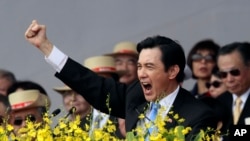Taiwan and political rival China are negotiating this week what could be their farthest-reaching agreement ever after nearly eight years of warming relations. But the deal to cut tariffs faces opposition in Taiwan, while China has turned much of its attention to pacts with fellow exporters Japan and South Korea.
Trade representatives from Beijing and Taipei are meeting in China from Tuesday through Thursday for a 10th round of talks on an agreement to cut import tariffs, potentially in thousands of key Taiwan sectors such as machinery and flat panels. Talks may wrap up this year.
Liu Yi-jiun, a public affairs professor at Fo Guang University, expects exporters to push for passage of the deal despite opposition from Taiwanese distrustful of China’s political ambitions.
“Don’t ever underestimate the power on the part of the business sectors. World market competitiveness has forced [the government] to take a more aggressive role in pushing through this deal. So as far as businesswise, I think this is the year this deal is going to pass, for sure,” said Liu.
Taiwanese exporters want the agreement passed so they can pay lower tariffs to China, the island’s No. 1 trade partner last year. Taiwan’s Bureau of Foreign Trade said in a statement March 25 the island cannot afford to wait on the trade-in-goods deal with China.
Its statement came as China and Taiwan’s export competitor South Korea prepare to sign their own free-trade agreement (FTA). The same pair and export giant Japan have finished four rounds of talks on a separate pact.
But Taiwan President Ma Ying-jeou’s Nationalist Party also worries about a voter backlash when the island elects a new president in January. Taiwanese who oppose stronger ties with China have influenced government decision making since thousands of activists closed down parliament in March 2014 to block ratification of a service trade liberalization pact signed with Beijing.
China has claimed sovereignty over self-ruled Taiwan since the 1940s, but in 2008 Ma’s government set aside political differences to discuss trade and investment. The two sides have signed 21 economy-related agreements to date, a lift to Taiwan’s half-trillion-dollar economy.
Yet many on the island fear China will leverage the deals to push for political unification as two-way trade passed $130 billion for the first time last year.
Andrew Tsai, an economist with KGI Securities in Taipei, expects tariff-cut negotiations to slow as Taiwanese officials try to reconcile business interests and election pressure.
He said the China-Japan-South Korea FTA will be confirmed for signing in mid-year and of course that will put pressure on Taiwan’s exports or on its own trade deal, possibly meaning they get left behind. Tsai adds that early next year Taiwan has its presidential election and thinks that before the election diplomatic negotiations are likely to meet a public opinion backlash, so it’s possible the negotiations will be slowed down.
A Nationalist presidential candidate is likely to run next year against an opponent from the Democratic Progressive Party, which takes a more cautious stance on China relations.
China began showing signs of weariness with Taiwan last year after parliament sidelined the service trade agreement. Analysts say Beijing is keener now on tie-ups with South Korea and suspect the tariff deal being negotiated with Taiwan has been thinned down, axing top export categories in machinery and high-tech hardware. Joanna Lei, chief executive officer of the Chunghua 21st Century Think Tank in Taiwan, said the pact with Taiwan is largely for show.
“I think it’s just a gesture saying that cross-Strait trade negotiations haven’t completely stopped, but it will not be very major in terms of opening huge markets and lowering major industries’ tariffs,” said Lei.
Taiwanese officials will not disclose which export categories are on the negotiating table this week, but the foreign trade bureau said Beijing’s ties with South Korea would be a focus of the negotiations.




